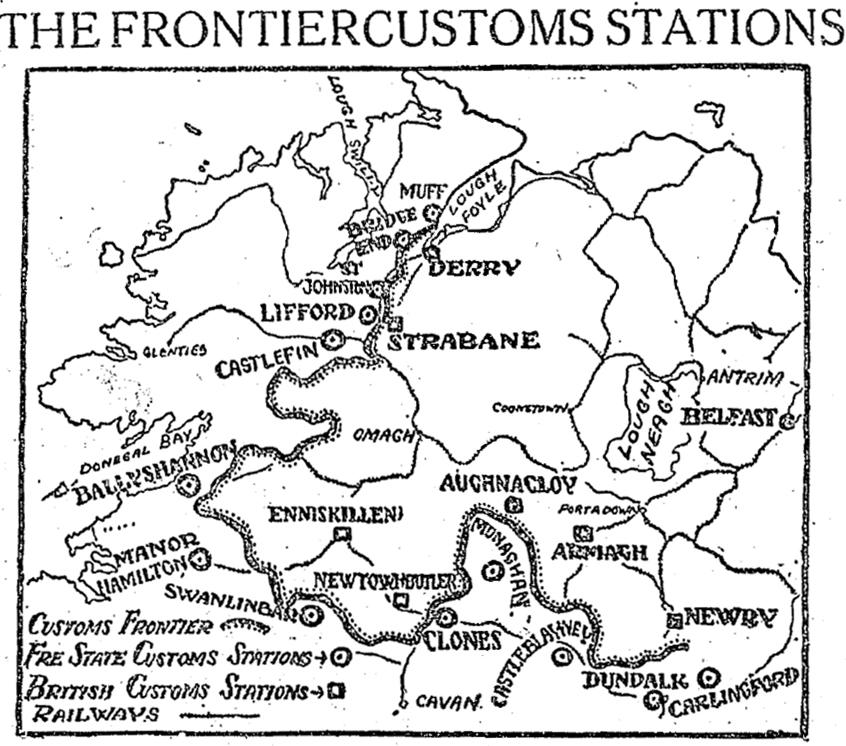Day One of Ireland’s new Customs border
Dublin, 2 April 1923 - Customs barriers came into operation yesterday - April Fool’s Day - on the island of Ireland meaning that, for the first time, all persons travelling between Northern Ireland and the Irish Free State by road or rail were liable to be searched. The new arrangements marked the emergence of the Irish Free State as a fiscal autonomous.
Only a single train yesterday ran from Dublin to Belfast and its journey was reported to have been smooth: passengers handed ‘declarations’ to the booking clerk at Amiens Street station from where the train departed on time.
To gauge the experience, a Special Correspondent of the Irish Times travelled from Holyhead to Bessbrook via Dublin and reported the trip to have been uneventful. On the train north, he reported that it was the intention to check baggage between Geraghwood or Bessbrokk and Portadown when the train is moving so as to avoid delays. At Dundalk station, a large group of staff from the Free State Inland Revenue Department were observed preparing to undertake checks on the first train from Belfast.
Returning to Dublin by road, the reporter was questioned at an Imperial Customs Station near Newry, but not at a Free State Customs post. The Newry Custom Post was described as a neat octagonal tin pagoda housing three officials, only one of whom on this occasion was wearing a uniform. The Irish Time's reporter was questioned politely as to whether he was carrying any hosiery latch needles, synthetic or organic chemicals, cinematograph films and the like. When the reporter travelled past the Free State Customs post, it appeared inoperative and there was not a single official to be seen. This, however, was just the first day of the new regime.
Pathé footage of the Free State’s new Customs checks in operation
In advance of the customs arrangements taking effect, there was a major increase in the traffic volumes along border areas, notably from Derry City to Donegal and in the Strabane and Lifford areas. Indeed, such was the level of activity that the Derry and Lough Swilly Railway Company ran an extra train to clear the load before the midnight introduction of the customs frontier. Donegal traders are believed to have sufficiently stocked up on many items to last a couple of months. However, it was the high number of cars that were being delivered into the Free State that was most striking.
It was a similar scene in Dublin; several additional steamers were deployed to deliver the large quantities of supplies from England into the Free State in advance of the new regulations taking effect. Unprecedented volumes of imported cars were reported to have been trafficked, while the supply of tobacco and cigarettes into the country is understood to be sufficient for several months.
There remains much uncertainty among businesses as to the impact the customs barriers will have on trade, although both the Dublin Chamber of Conference and the Associated Chambers of Commerce had been urging the Government to postpone the measures.Such a course, President Cosgrave responded, was impossible as it would involve a negotiation of an agreement with Britain and the passage of fresh legislation through the Oireachtas before the end of the month.
In a letter to the Dublin Chamber of Commerce, President Cosgrave’s Private Secretary noted that Mr. Cosgrave fully realised that the ‘introduction of the new Customs regime must inevitably be attended with a certain amount of difficulty, but he feels that he can rely on the trading community to do what they can to obviate unnecessary delay, and that the Customs authorities will grant all possible facilities to traders in the passage of their goods out of Customs custody.’
[Editor's note: This is an article from Century Ireland, a fortnightly online newspaper, written from the perspective of a journalist 100 years ago, based on news reports of the time.]





















